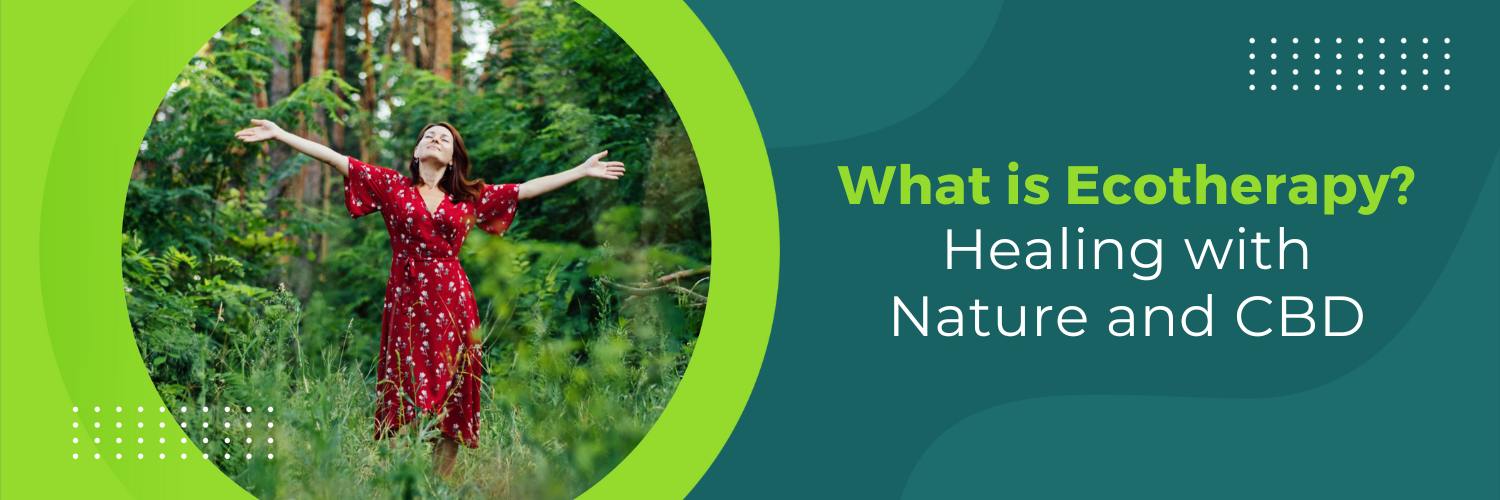Ecotherapy and CBD
In recent years, there has been a growing interest in ecotherapy, a therapeutic approach that harnesses the healing power of nature to improve mental and emotional well-being. As people seek more natural and holistic methods of healing, ecotherapy has gained popularity as an effective way to connect with nature and promote overall wellness. Moreover, with the increasing interest in CBD as a natural remedy for various health issues, the combination of ecotherapy and CBD has become an intriguing area of exploration.
In this blog, we will explore the world of ecotherapy, its origins, and its potential benefits. Additionally, we will explore how the integration of CBD can enhance the therapeutic effects of ecotherapy, creating a unique synergy between nature and cannabidiol for healing and well-being.
What is Ecotherapy?
Ecotherapy, also known as nature therapy or green therapy, is a therapeutic approach that recognizes the interconnectedness between nature and human well-being. It draws inspiration from various disciplines, including eco-psychology, eco-philosophy, and conservation psychology. The fundamental idea behind ecotherapy is that spending time in nature and engaging in outdoor activities can have profound positive effects on mental health and emotional balance.
The core principle of ecotherapy lies in the belief that humans have an innate affinity for nature, and when we connect with the natural world, it can lead to a sense of grounding and inner peace. Nature acts as a therapeutic container, providing a space for individuals to explore their thoughts and emotions more openly and authentically. Nature’s rhythms, cycles, and resilience often serve as metaphors for personal growth and resilience.
Ecotherapy employs various techniques, including wilderness therapy, horticultural therapy, and outdoor experiential activities, to foster a deeper connection with nature. Some common practices include mindfulness exercises in natural settings, eco-walks, wilderness adventures, and nature-based rituals to facilitate healing and self-discovery.
Benefits of Ecotherapy
Ecotherapy, also known as nature therapy or green therapy, offers a wide range of mental, emotional, and physical health benefits. Spending time in nature and engaging in ecotherapy practices can positively impact various aspects of well-being. Here are some key benefits of ecotherapy:
1. Stress Reduction: Nature has a calming effect on the human mind and body. Engaging in ecotherapy activities such as walks in the park, gardening, or simply sitting by a river can help reduce stress levels. The sights, sounds, and smells of nature have a soothing effect, promoting relaxation and reducing feelings of tension and anxiety.
2. Improved Mood and Mental Health: Regular exposure to natural environments has been linked to improved mood and overall mental well-being. Nature’s beauty and tranquility can uplift the spirit and foster a positive outlook on life. Ecotherapy can be particularly beneficial for individuals dealing with depression, helping to alleviate symptoms and enhance emotional resilience.
3. Increased Physical Activity: Many ecotherapy activities involve physical movement, such as hiking, cycling, or gardening. Engaging in outdoor physical activities not only promotes better physical health but also releases endorphins, the body’s natural mood elevators, leading to an improved sense of happiness and contentment.
4. Enhanced Cognitive Function: Spending time in nature has been associated with improved cognitive function and increased attention span. Nature’s peacefulness allows the mind to rest and recharge, enhancing concentration and problem-solving abilities.
5. Connection and Mindfulness: Ecotherapy encourages individuals to be present in the moment and cultivate a deeper connection with the natural world. Practicing mindfulness in nature can help individuals let go of worries about the past or future and fully engage with the beauty and serenity of the present moment.
6. Coping with Trauma and Grief: Nature’s healing qualities can provide a safe space for individuals to process trauma or grief. Ecotherapy activities can facilitate emotional expression and support the healing process by offering a nurturing environment to work through difficult emotions.
7. Increased Social Interaction: Participating in ecotherapy activities, such as group hikes or community gardening projects, can foster social interaction and a sense of community. Building connections with others who share a love for nature can provide a support network and combat feelings of loneliness.
8. Immune System Boost: Spending time in nature has been linked to a stronger immune system. Breathing in fresh air and exposure to natural elements can enhance the body’s immune response, contributing to better overall health.
9. Eco-awareness and Conservation: Engaging in ecotherapy often leads to increased environmental awareness and a greater appreciation for nature. As individuals connect more deeply with the natural world, they may become more conscious of environmental issues and take actions to contribute to conservation efforts.
10. Sense of Purpose and Meaning: Engaging in ecotherapy and nurturing plants or participating in environmental initiatives can provide individuals with a sense of purpose and fulfillment. Working with nature and contributing positively to the environment can give life a deeper sense of meaning.
The Connection Between Nature and CBD
CBD, short for cannabidiol, is a non-psychoactive compound found in the cannabis plant. It interacts with the body’s endocannabinoid system, which plays a crucial role in regulating various physiological processes, including mood, pain perception, and stress response.
Studies have shown that CBD may have anxiolytic and antidepressant properties, making it a promising option for individuals seeking natural solutions for mental health challenges. When combined with ecotherapy, CBD can potentially enhance the therapeutic effects of spending time in nature. The calming and relaxing properties of CBD may complement the already soothing and restorative qualities of nature, providing individuals with a more profound sense of peace and well-being.
While the research on the combination of nature and CBD is still evolving, anecdotal evidence suggests that many individuals have experienced positive outcomes when using CBD as a supportive element during ecotherapy sessions or outdoor activities
Incorporating CBD in Ecotherapy Practices
Integrating CBD into ecotherapy practices can be done through various methods.
- CBD oils and tinctures can be taken orally or sublingually before or during ecotherapy sessions to promote a sense of calm and relaxation.
- CBD-infused creams or balms can be applied topically to ease muscle tension and provide a soothing sensation during outdoor activities.
- CBD edibles, such as gummies or capsules, offer a discreet and convenient way to consume CBD while engaging in nature-based therapies.
- CBD vape pens or inhalers could be used, although environmental considerations should be taken into account when using such methods in natural settings.
It is essential to consider safety aspects when incorporating CBD into ecotherapy practices. Individuals should consult with a healthcare professional or a knowledgeable CBD expert to determine appropriate dosages and potential interactions with any existing medications.
Ecotherapy and CBD for Specific Conditions
Ecotherapy combined with CBD shows promise in offering a complementary and holistic approach to managing specific mental and physical health conditions. While it’s important to note that ecotherapy and CBD are not intended to replace traditional medical treatments, they can serve as valuable additions to an individual’s overall wellness plan. Here’s how ecotherapy and CBD may be beneficial for specific conditions:
1. Anxiety Disorders
Ecotherapy, with its calming and grounding effect, can be particularly beneficial for individuals with anxiety disorders. Spending time in nature and engaging in outdoor activities can reduce stress and anxiety levels. The serenity and beauty of natural environments help shift focus away from anxious thoughts, promoting relaxation and a sense of peace.
CBD’s potential anxiolytic properties can further support anxiety management. CBD interacts with the endocannabinoid system, which plays a role in regulating stress response and anxiety. Many individuals find that CBD helps reduce feelings of anxiousness and promotes a sense of calmness, which can complement the soothing effects of ecotherapy.
2. Post-Traumatic Stress Disorder (PTSD)
Ecotherapy offers a gentle and non-intrusive approach to dealing with trauma, making it suitable for individuals with PTSD. Nature’s nurturing qualities can create a safe space for processing traumatic experiences. Engaging in ecotherapy activities can help individuals reconnect with their bodies and emotions, fostering healing and resilience.
CBD’s potential to ease hyperarousal symptoms associated with PTSD may further support the therapeutic process. CBD’s calming effects can aid in reducing heightened anxiety, hypervigilance, and sleep disturbances commonly experienced by those with PTSD. Combined with ecotherapy, CBD may help individuals feel more grounded and in control, assisting in their journey towards healing.
3. Chronic Pain Management
For individuals dealing with chronic pain, ecotherapy can offer a holistic approach to pain management. Spending time in nature and engaging in gentle physical activities can distract from pain sensations and provide a more positive outlook on life.
CBD’s potential analgesic and anti-inflammatory properties make it an intriguing addition to pain management. CBD may help reduce pain and inflammation, offering a more natural alternative to traditional pain medications. When combined with ecotherapy, CBD can provide a comprehensive approach to managing chronic pain, addressing both physical and emotional aspects.
4. Depression and Mood Disorders
Ecotherapy’s ability to improve mood and overall mental well-being can be beneficial for individuals dealing with depression and mood disorders. Engaging in outdoor activities can release endorphins, the body’s natural mood elevators, leading to feelings of happiness and contentment.
CBD’s potential antidepressant properties may complement ecotherapy’s positive effects on mood. CBD may interact with serotonin receptors in the brain, which are associated with mood regulation. Combining CBD with ecotherapy can create a supportive environment for individuals to cope with depressive symptoms and foster a more positive outlook on life.
5. Attention Deficit Hyperactivity Disorder (ADHD)
Ecotherapy’s focus on mindfulness and present-moment awareness can be helpful for individuals with ADHD. Spending time in nature allows individuals to engage their senses and improve concentration and attention.
CBD’s potential calming effect may also aid in managing ADHD symptoms. Some individuals with ADHD report experiencing improved focus and reduced hyperactivity after using CBD. Combined with ecotherapy’s grounding benefits, CBD may offer a holistic approach to managing ADHD symptoms.
6. Sleep Disorders
Ecotherapy’s ability to promote relaxation and reduce stress can positively impact sleep quality. Spending time in nature can regulate sleep-wake cycles and improve sleep patterns.
CBD’s potential to improve sleep quality and address insomnia makes it a valuable addition to ecotherapy for individuals with sleep disorders. CBD’s calming and anxiolytic effects can help reduce sleep disturbances and promote a more restful night’s sleep.
7. Substance Use Disorders
Ecotherapy can serve as a valuable tool in addiction recovery by providing a healthy and positive outlet for coping with stress and emotions. Engaging in ecotherapy activities can support individuals in their journey towards sobriety and help them reconnect with nature.
CBD’s potential role in addiction recovery is currently being studied, but some research suggests that CBD may help reduce drug cravings and withdrawal symptoms. Combined with ecotherapy’s positive impact on mental and emotional well-being, CBD may be a supportive element in substance use disorder treatment.
8. Autoimmune and Inflammatory Conditions
For individuals with autoimmune and inflammatory conditions, ecotherapy’s stress-reducing effects can be beneficial. High-stress levels can exacerbate inflammation, and ecotherapy can help mitigate stress and support overall well-being.
CBD’s potential anti-inflammatory properties may offer additional relief for those with autoimmune and inflammatory conditions. By reducing inflammation, CBD can complement ecotherapy’s efforts in promoting better health outcomes.
9. Social Isolation and Loneliness
Ecotherapy’s emphasis on social interactions and community involvement can combat feelings of social isolation and loneliness. Engaging in ecotherapy activities with others who share a love for nature can create a sense of belonging and support.
CBD’s potential to reduce social anxiety may help individuals feel more comfortable engaging in social activities during ecotherapy sessions, further strengthening their sense of connection and community.
It’s important to reiterate that ecotherapy and CBD should not replace medical treatments or therapies prescribed by healthcare professionals. Individuals with specific health conditions should consult with their healthcare providers before incorporating ecotherapy and CBD into their wellness practices to ensure a safe and effective approach to managing their conditions.
Conclusion
Ecotherapy stands as a powerful and nature-based healing practice that fosters a deeper connection with the natural world to improve mental and emotional well-being. When combined with CBD, the potential therapeutic benefits are heightened, offering individuals a unique and holistic approach to healing.
By spending time in nature and incorporating CBD as a supportive element, individuals may experience reduced stress, improved mood, and enhanced emotional resilience. As research on the combination of nature and CBD continues to evolve, it is becoming increasingly clear that this complementary approach holds immense promise for those seeking natural alternatives to support their mental and emotional health.
If you’re interested in exploring the benefits of ecotherapy and CBD further, consider checking out the products offered by Leaf Alleviate. Leaf Alleviate provides premium CBD products that are designed to enhance your well-being and complement your ecotherapy experiences. Their high-quality CBD oils, topicals, and edibles can be a valuable addition to your nature-based healing journey. Take the next step towards a more balanced and connected life by visiting Leaf Alleviate’s website to learn more about their products and how they can support your mental and emotional health. Embrace the healing power of nature and CBD with Leaf Alleviate today!
FAQs
Q: What are the benefits of spending time in nature for mental health?
Spending time in nature reduces stress, improves mood, and enhances overall mental well-being. It can also alleviate symptoms of anxiety and depression.
Q: Is CBD safe to use during ecotherapy sessions?
CBD is generally safe when used appropriately, but it’s essential to consult with a healthcare professional or CBD expert, especially if you’re on medications or have specific health conditions.
Q: How can CBD enhance ecotherapy effects?
CBD provides additional calming properties and may amplify the sense of peace and well-being during ecotherapy sessions. It can complement the benefits of spending time in nature.
Q: Are there any potential side effects of using CBD with ecotherapy?
Some individuals may experience mild and temporary side effects, such as drowsiness or dry mouth. Start with a low dosage and consult with a healthcare professional before use.
















